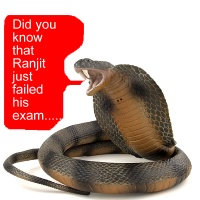Template:AOW166: Difference between revisions
Hari singh (talk | contribs) No edit summary |
Hari singh (talk | contribs) No edit summary |
||
| (3 intermediate revisions by the same user not shown) | |||
| Line 1: | Line 1: | ||
{{aowh|[[Ninda|Ninda - to slander, slur, backbite or smear]]}} | {{aowh|[[Ninda|Ninda - to slander, slur, backbite or smear]]}} | ||
[[Image:Cobra v3.jpg|thumb|200px|right|{{c|"'''Nindeya'''" - ''to slander, slur, backbite or smear''}}]] | [[Image:Cobra v3.jpg|thumb|200px|right|{{c|"'''Nindeya'''" - ''to slander, slur, backbite or smear''}}]] | ||
'''Ninda''' (<big> ਨਿੰਦਾ </big>) or '''Nindeya''' are words in [[Punjabi]] which mean to '''slander''', '''slur''', '''backbite''' or '''smear''' and are words used to describe a defamatory or negative statement made about someone. | |||
The derogatory account is usually made when the person about whom the venom is being spat is not present or is not within ear-shot of the conversation. | |||
This type of harmful speech (called "Nindeya") is usually carried out to cause harm to the other person, to ruin the other person's reputation or generally to denigrate the other person's status. The main reason and motivation for slandering is that it gives the maker of the slander "satisfaction" as it makes them feel important and they feel they are "better" and more "righteous" than the person being slandered. The [[Sikh Gurus]] condemn this action and write against this ugly habit. | This type of harmful speech (called "Nindeya") is usually carried out to cause harm to the other person, to ruin the other person's reputation or generally to denigrate the other person's status. The main reason and motivation for slandering is that it gives the maker of the slander "satisfaction" as it makes them feel important and they feel they are "better" and more "righteous" than the person being slandered. The [[Sikh Gurus]] condemn this action and write against this ugly habit. | ||
{{Srig3|88|3552|ਪਰ ਨਿੰਦਾ ਕਰੇ ਅੰਤਰਿ | {{Srig3|88|3552|ਪਰ ਨਿੰਦਾ ਕਰੇ ਅੰਤਰਿ ਮਲੁ ਲਾਏ ॥ ਬਾਹਰਿ ਮਲੁ ਧੋਵੈ ਮਨ ਕੀ ਜੂਠਿ ਨ ਜਾਏ ॥| Par ninḏā kare anṯar mal lā▫e. Bāhar mal ḏẖovai man kī jūṯẖ na jā▫e.|'''He slanders others, and pollutes himself with his own filth. Outwardly, he washes off the filth, but the impurity of his mind does not go away'''.}}<!--------- | ||
By performing Nindeya, one pollutes ones own mind. When a person wants to tell a negative about someone else, it is the motivation that causes harm to the person doing the "nindeya". If you want to tell your friends something negative about another person - stop! Remember, the wise words of the Guru. If you are a [[Gurmukh]] move on to something else. Never engage in negative discussions about someone who is not present. {{aowf|Ninda}} | By performing Nindeya, one pollutes ones own mind. When a person wants to tell a negative about someone else, it is the motivation that causes harm to the person doing the "nindeya". If you want to tell your friends something negative about another person - stop! Remember, the wise words of the Guru. If you are a [[Gurmukh]] move on to something else. Never engage in negative discussions about someone who is not present. ------->{{aowf|Ninda}} | ||
Latest revision as of 13:00, 16 March 2015
Ninda ( ਨਿੰਦਾ ) or Nindeya are words in Punjabi which mean to slander, slur, backbite or smear and are words used to describe a defamatory or negative statement made about someone.
The derogatory account is usually made when the person about whom the venom is being spat is not present or is not within ear-shot of the conversation.
This type of harmful speech (called "Nindeya") is usually carried out to cause harm to the other person, to ruin the other person's reputation or generally to denigrate the other person's status. The main reason and motivation for slandering is that it gives the maker of the slander "satisfaction" as it makes them feel important and they feel they are "better" and more "righteous" than the person being slandered. The Sikh Gurus condemn this action and write against this ugly habit.
"ਪਰ ਨਿੰਦਾ ਕਰੇ ਅੰਤਰਿ ਮਲੁ ਲਾਏ ॥ ਬਾਹਰਿ ਮਲੁ ਧੋਵੈ ਮਨ ਕੀ ਜੂਠਿ ਨ ਜਾਏ ॥" " Par ninḏā kare anṯar mal lā▫e. Bāhar mal ḏẖovai man kī jūṯẖ na jā▫e." "He slanders others, and pollutes himself with his own filth. Outwardly, he washes off the filth, but the impurity of his mind does not go away." (SGGS p 88) .....More

